#he loves alyosha so much!
Explore tagged Tumblr posts
Text
still very much of the opinion that more people would appreciate pavel if they were able to look past the narrator's bias. the question of the narrator’s exact identity, ephemeral and shifting as it is, warrants consideration here as well.
#i made a tongue in cheek post about the narrator question in demons as well but#whether it’s dostoevsky himself (the whole time? perhaps only some of the time?)#or some amalgamation of the town itself#or some secret third thing in the vein of bakhtin’s uncontrollable characters theory#for all that the narrator loves alyosha they do not extend that same affection to pavel#(also interesting to consider how much of himself and his son he put into these two characters)#i suppose i’m separating narrator and narrative in my mind though bc i don’t believe you’re meant to#leave the story despising pavel. if anything i feel like it’s natural to feel the compassion for him that no one in the story could#i mean readers evidently feel it for ivan so why not his double?#the brothers karamazov#📘.txt#lit tag
22 notes
·
View notes
Text
geto reminds me so much of alyosha, not because they share the same ideals but in the sense that every time they appear in the story it's like that page is a love letter to them. to be loved is to be remembered and everyone that truly gets to know them just holds such a special place for them in their hearts. they inspire, they comfort, they love so unconditionally. geto haunts the narrative, not because of his villainous acts but because he loved so much. and he was so loved in return!
#gojo‚ mimiko and nanako‚ miguel and larue...#they all cared so much <3#stsg's love was so pure.#geto is a lot like yuuta in that regard#they're both willing to do anything for the people they love#and they both see love as something mutual#if yuuta had to learn to let go to attain this pure and mutual love in jjk 0 then geto shows this during his youth letting gojo behind and#protecting him from staining his hands like he did#even in his last moments he tried to avoid gojo was the one to be burdened with taking his life#geto wasn't okay but even in such vulnerability and distress‚ even in such desperation‚ his priority was always to guarantee gojo was well#and gojo's trust in this love was so absolute it led him to completely disregard his powers‚ something that defined him all his life#he let go of his safety net for a feeling. a feeling so strong that geto would never betray him or put him in a situation of distress#despite looking directly at his body standing in front of him#they make me so sick i'm sorry#😭😭😭#also sorry for the russian novel character comparison but alyosha is also very dear to me#and i swear the vibes are the same when it comes to them#geto has committed attrocities yet all memories people have of him are tender and loving#you know?#he's everthing to me aaaaaa
0 notes
Text
TO THE KRAVEN SIMPS EXCITED FOR HIS MOVIE!
And people who just need a Kraven The Hunter run down/Information lore
As a certified Kraven know it all from his comics I am here to help give yall some advice/run down/and how to start your journey into his comics and lore! Well, at least the MAIN Kraven. Damn those comics and their multiverse!
Don’t be shy in asking me questions either, of course until DEC: 13th check my #Belladonna Rambles or #Life Update to see what I mean
Alright let’s start now!
Kravens Last Hunt
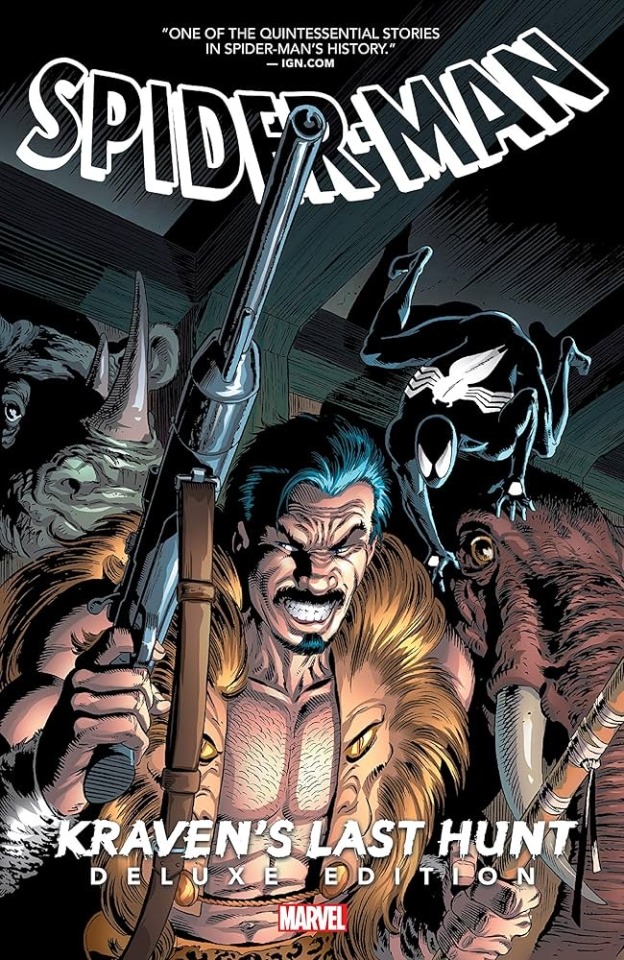
YOU MUST READ THIS BOOK
This shit here? PEAK! It as PEAK AS PEAK GETS! You really get to study and analyze what makes Kraven tick, how his family impacted him, and just the over all headspace the master hunter is. Treat this as much of an origin story as anything else. Warning though it gets dark and ENDS Dark. It is BEYOND important you read this. You HAVE to read this. It’s a defining comic story that causes a chain reaction for everything after. If you only read one comic book ever? MAKE IT THIS! If you only read one Kraven comic MAKE IT THIS! I can say how important this comic is. YOU NEED TO READ THIS COMIC
The Unbeatable Squirrel Girl
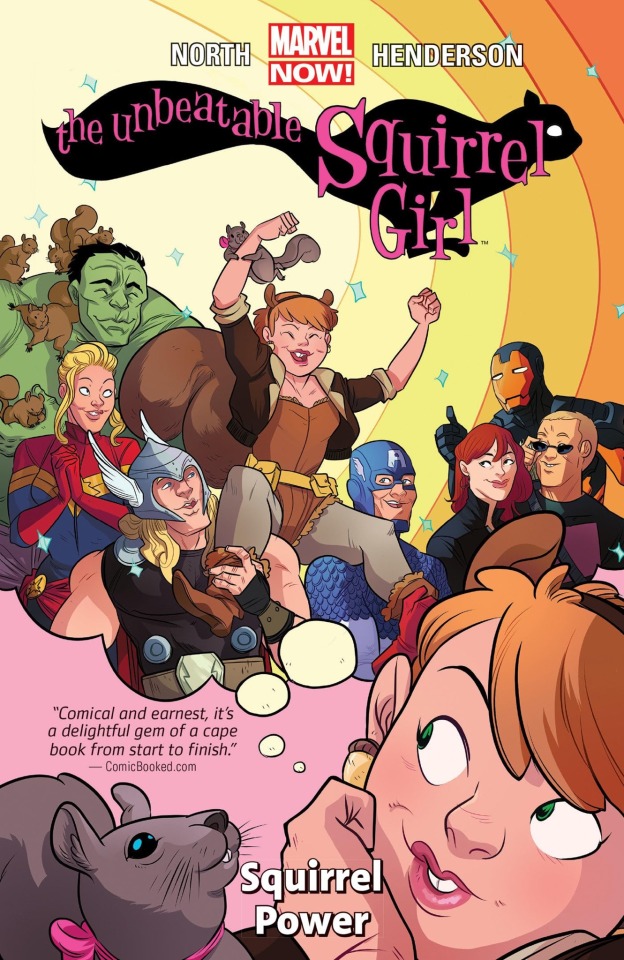
A great comic series in general, but here we get to also see a story line of Kraven following into a Vigilante hood instead of staying a Villian. There’s a court arce and everything. It’s a far more light hearted story line, with amazing fun that is really enjoyable. It’s also SUPER GOOD for people NEW to comics as a whole! Very light hearted, silly, and impactful. It’ll also help get you familiar with a lot of marvel characters without it being suffocating! You also get some good insight on Kraven from a far more modern and gentler angle. Squirrel Girl is PEAK. You’ll love this I promise
The Amazing Spider-Man # 15
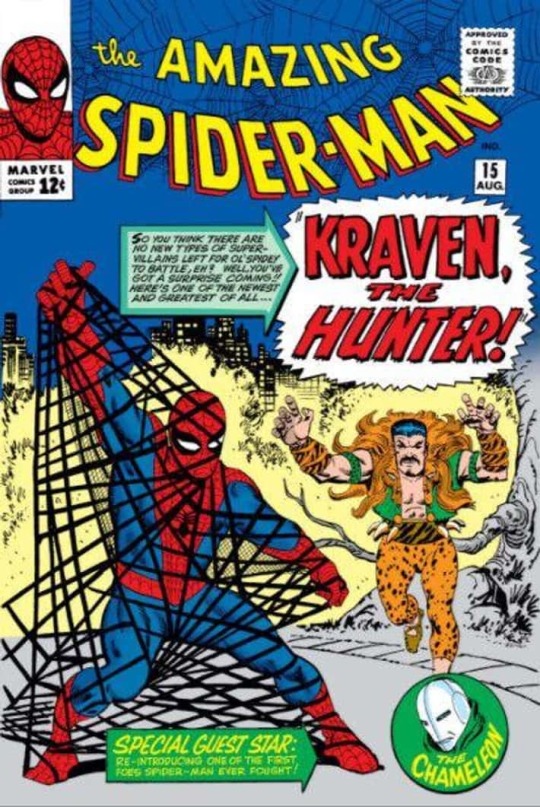
This is his debute, so obviously gotta read that. It surprisingly shows how there’s alot of details that haven’t changed. Such as he still has his half brother. It’s always so cool to see where they started and how they developed now
GET KRAVEN
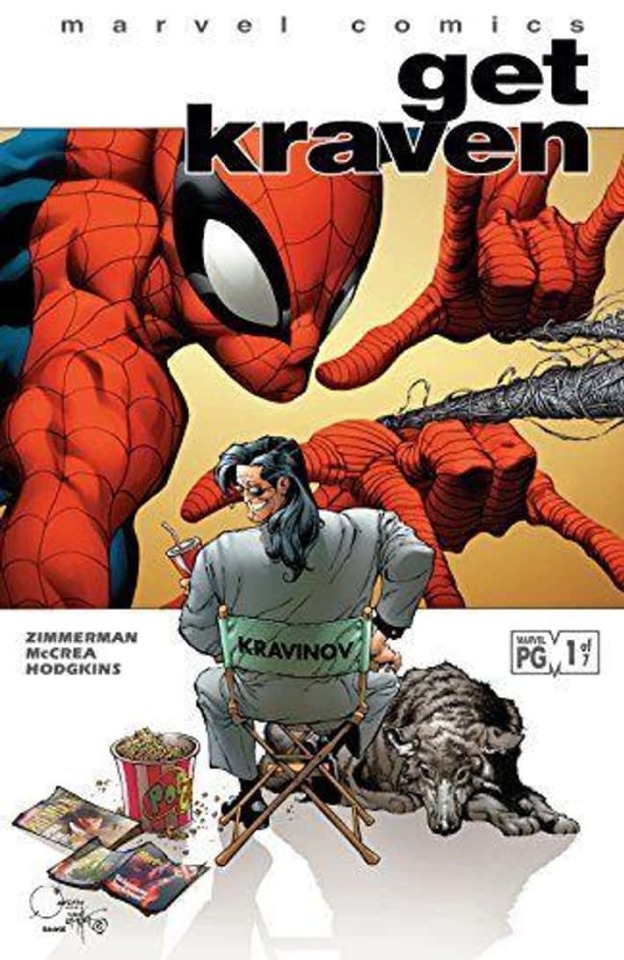
This is actually a story about one of his KIDS. Alyosha! It’s a really interesting comic as it’s about one of his sons, and said son is a movie producer no less. It’s quite the adventure. It also leads to a good transition to the next topic-!
The Family
Ight so, given how comics are time lines can get messy. Like “Oh this Kraven is THIS kid actually and that Kraven is another time line so-“ Since Kraven is a TITLE more so then a NAME. So lots of stories about ‘Kraven’ are sometimes about his kids in general. Comics can be confusing I know, so imma help you guys with knowing bullet point facts to help keep you grounded. I got you
Sasha
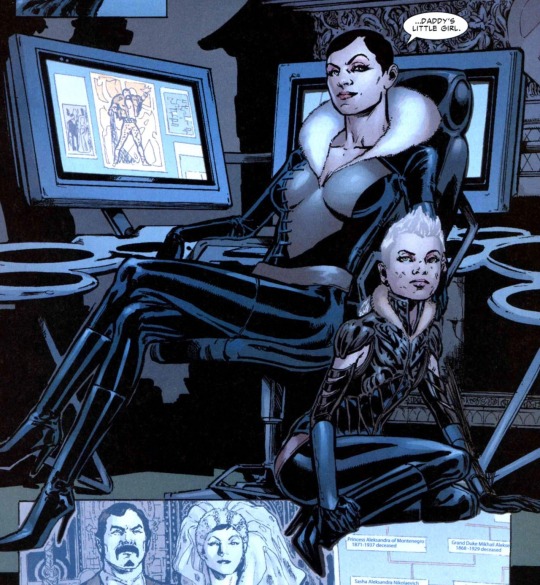
The wife of Kraven. Mother to their (four MAIN) children. Aleksandra She doesn’t really become prevalent until after The Last Hunt. Can’t spoil it but she kinda goes bat shit insane and became a horror beyond measures after the incident. Oh she can be a roller coaster.
Grim
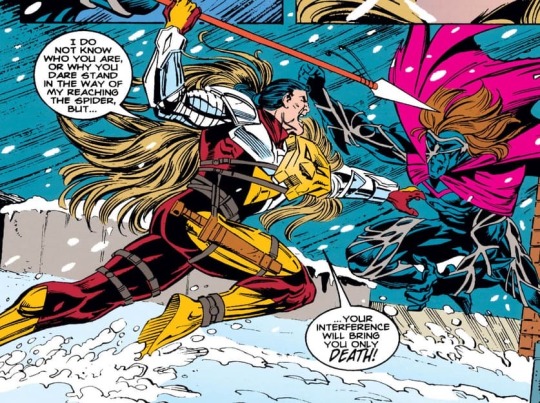
Vladimir is the eldest, and followed his father’s foot steps the closes. Even had a run in with Spider man. Unfortunately he became a victim of his mother’s insanity, and was mercy killed by his father. His father knew this was worse than hell, and wanted to do what an every good father does. Take care of his baby
Alyosha
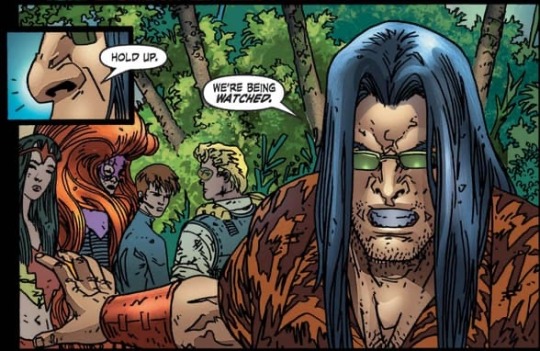
Second son, and honestly the most wasted. His arc as a Hollywood star is super short and soon he’s just “another Kraven” which is lame. Him being a successful movie producer/actor what have you is honestly rather important, given his uncle is a failed actor. Lots of wasted potential, so I’m shining light on him. He deserves it
Nedrocci
Another victim of “another Kraven” and his role is so small that there isn’t even much detail to begin with. Hence the lack of image. His only real arc is trying to kill his older brother Alyosha and failing. Then his uncle, the chameleon, ended up killing him. Shame. Just another Kraven and meat to grind
Ana
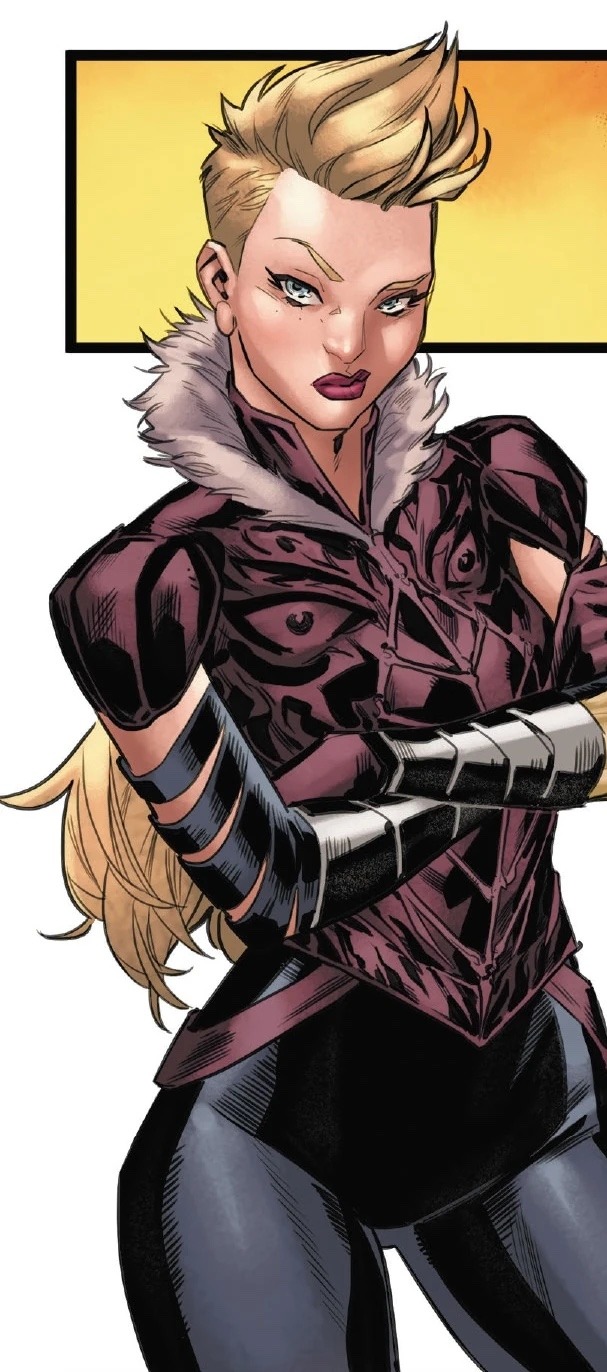
Anastasia, named after his mother, is the baby and daddy’s girl. Also she seems to be the only person writers remember whenever doing some kind of family story for the Kravinoff’s. Writers forget her siblings and keep making throw away characters to be her brothers. Anyway! Like her siblings her major story line doesn’t really started after The Last Hunt. Like I said, that book is KEY to Kraven. She’s very capable and independent and followed her fathers foot steps all the same
Dimitri
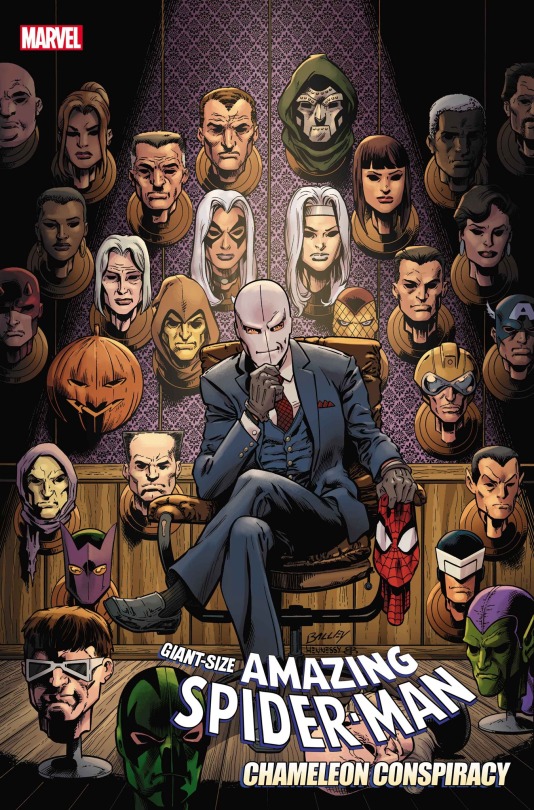
Dimitri Smerdyakov is Sergei’s half brother. Like many villains the origin story often gets changed for the time lines but over all his important arc is he’s always trying to impress Sergei. To prove his worth to the Kravinoff name. Even had a moment where he nearly killed iron man, to show he’s the deadlier brother. As you can tell the family is very messy
Calypso
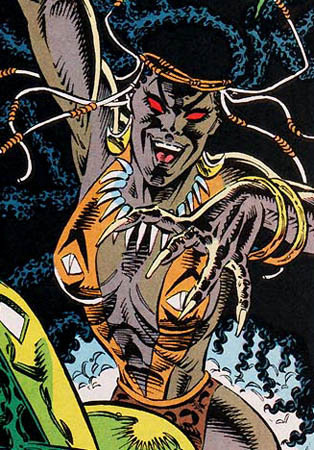
Yeah she’s your stereotypical Voodoo Priestess. Even sacrificed her younger sister for more power. Yeah this didn’t quite age well. She is rather important because she is a love interest or his, but was extremely toxic and abusive. Men can be abused to. She is also someone who was a major factor in the climax of The Last Hunt. She took joy in what happened even. Yeah she’s…..She is an abusive woman that really damaged Kraven. A important note that men can be abused to, and that despite being so big and strong he can very well be a victim to.
Key Facts/Points
His super human abilities come from potions he’s made from herbs. So yall complaining about how he got his super powers in the movie gotta remember comics didn’t have much flavor either. Literally magic potions and voodoo magic. Like come on
His mother died due to mental illness. Aka Took Her Own Life. It’s always kept vague, but it’s made more clear what it was through The Last Hunt and what happened to Kraven
He becomes an Anti-Hero/Vigilante through Squirrel Girl. He goes by the name “Kraven The Hunter of Hunters” like that shit goes hard don’t lie
He’s a Russian immigrant that escaped Russia around the February Revolution. (It varies often but it’s always escaping Russia in a downfall) Aka before the fall of Russia into communism. So he’s OLD old, and has quite the love hate for his roots
He has mental illnesses. Not like just in general. Like it’s not stated but it’s very much implied he’s suffering from extreme depression that lead to suicidal ideations
He is a big game hunter and is highly respectful of nature and its order. He respects nature and it respects him. He believes in a proper fight with animals, and understands they’re important. By proxy that def means he believes in trans rights and LGBTQ+ concepts so slay Ally! Stay mad dude bros ((fun fact. Lionesses have been shown to grow their own manes and take leadership of prides. Lions can literally say “I’m trans now” and do it. So go my children. Give us trans Kraven headcanons!))
He’s one of Spider-Man’s main villains. He’s been in nearly every cartoon there has been, and was a founding member of The Sinister Six. Safe to assume Chameleon replaced him when he took his anti-hero arc
Yes. It was stated he was based on “The Most Dangerous Game” Hence the Russian and x y z. You aren’t crazy for seeing those connections
The Kravinoff name is from a Noble class blood line. Very rich, aristocrats, rich people life. Until Russia’s downfall arc, so Kraven has money. Depending on the plot device of course
He has arachnophobia, which leads to another motivation to kill spider man. Not only is he the ultimate prey, but it’ll also be him concurring his fears
I hope this all helps. Remember, this is just a base line. There are so many versions of him. His videogame counterpart part, Spider Man 2, is very different and has his own arc and story line. Much like how so many comics have different time lines and universes.
But that’s what makes it beautiful and fun. It’s endless frankly Kraven can be whatever YOU want, because in a way it is canon. It’s just simply not spoken, but still true
If you have any questions for like specific Kravens or just advice on how Kraven would act or such don’t be shy and ask. I plan to do a headcanon list soon and get more information out there to help people new to him understand him
Hope this helps! Thank you for reading! Means a-lot you took the time to! Thank you, and have a happy comic book reading!
#kraven the hunter#kraven x reader#sergei kravinoff#marvel#marvel comics#spider man#spider man comics#spider man villains#sinister six#grim Kravinoff#Vladimir Kravinoff#Alyosha Kravinoff#Nedrocci Kravinoff#Ana Kravinoff#Sasha Kravinoff#calypso#marvel characters#comics#lore dump#comic lore#marvel lore#mental health#men can be victims too#remember that#just saying#that was a major plot point#squirrel girl#info dump#yeah I kinda like him alot as a character#he’s so fascinating
54 notes
·
View notes
Text
I LOVE HIMMMMMMMMAAAAAAAAAAHHHHHHHHHH

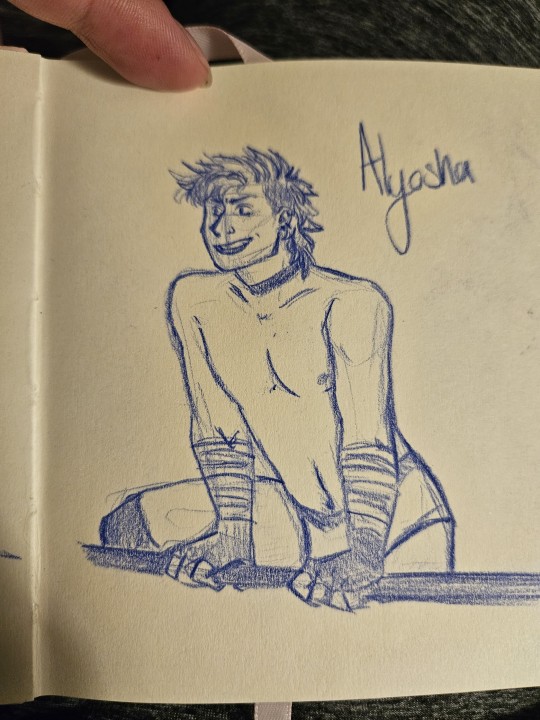
Alyosha is another that belongs to @cosmic--marmalade he is so special to me, he is a little shit 😊
8 notes
·
View notes
Text
I sort of used to think that the reason there’s no redemption for Smerdyakov’s character is, in part, due to the structural narrative of the novel and the setting— but that doesn’t entirely track on its own, given the themes presented in Crime and Punishment, considering Rodya’s crime is much worse and C&P is ALL about his redemption.
I think the real reason Smerdyakov gets no redemption is the Zhutchka thing.
It is passionately argued and established that Fyodor was no father, and so to murder him was no murder. If that applies to Mitya, then that applies to Smerdyakov even moreso, as Fyodor was, in the most literal sense, never a father to him, and failed him worse than he failed any of his children.
So that cannot be the thing that makes Smerdyakov irredeemable, or the reason he has to die.
We know about the cats, obviously. But that was only ever mentioned in passing, as something he did in childhood. I think that the fact that he has carried that pathology on into adult life is supposed to be received as a significant revelation, and it should be really shocking. It is really shocking. It’s just really fucking horrible to imagine. That whole encounter is shrouded in mystery, and we don’t really get any answers about it, like how these two met or why, or any context other than the fact that Ilusha is, now on his deathbed, completely fucking devastated.
It just sort of implies again that we’re only getting the tip of the iceberg in terms of Smerdyakov’s fucked up pathology. He has an even darker personality than we’ve previously been led to believe.
Y’all KNOW how much I love him, but I agree that if he does anything irredeemable it is that. And I agree that that is irredeemable. His childhood was not his fault, it fucked him up permanently and left him with absolutely no recourse as an adult. I still love him and I don’t even necessarily judge him, even for this, because… how can you?
It may be easy to pass judgment but the reality is that we’re talking about someone so abjectly abused and exploited that that’s not really relevant or appropriate, in my opinion.
Smerdyakov stood absolutely no chance at growing up into a normal, appropriately adjusted adult. The ONE most important thing that might help someone who comes from that kind of background break that cycle of abuse in adulthood is to be met with kindness and compassion. Smerdyakov’s childhood abuse made him weird and disgusting, and now he is shunned for being weird and disgusting.
It’s significant, that Smerdyakov’s one irredeemable act is what he does to Ilusha.
I think it’s also significant that Mitya shares this culpability in Ilusha’s suffering, (the “wisp of tow” incident), the same way he shares culpability with Smerdyakov in Fyodor’s murder, when he is tried and convicted despite his innocence.
Alyosha interferes in Ilusha’s violent outbursts while he is still a child, and meets him with love and compassion, and therefore Ilusha is saved. Not from death, but his soul is saved, in the most Christian, Dostoevskian sense.
Remember, Alyosha, disciple of Zossima, who preached about praying for the suicides, “being the servant of my servant”, and spoke of Joseph being sold into slavery by his own brothers on his deathbed.
Smerdyakov never received that kind of intervention from anyone, not in childhood, and now that he’s an adult, whatever compassion anyone might have once had for him is well past. And so it’s too late for him. But it’s not too late for Ilusha.
This is the great blind spot in Ivan’s ideology, is that he fails to see that these abused children grow up into adults, and frequently grow up into adults who often perpetuate the cycle of abuse.
The Brothers Karamazov is, fundamentally, a novel about children.
I’m reminded of Matthew 18:6: “If anyone causes one of these little ones—those who believe in me—to stumble, it would be better for them to have a large millstone hung around their neck and to be drowned in the depths of the sea.”
And, well, we all know how Smerdyakov died.
57 notes
·
View notes
Text
Allusions in Make the Exorcist Fall in Love
So far in Make the Exorcist Fall in Love there’s been a lot of allusions to various texts. I thought it might be fun to compile all the ones people have noticed so far as far as I've seen. Some of these are more speculative than others and I will update as I go along. Also, I read Ekuoto as free first read chapters on Mangaplus so unfortunately I can’t go back and check much so this is largely through memory, so if anyone has anything else to add I would greatly appreciate it! All I’ve got is a few screenshots and a dream. If I get anything wrong feel free to correct me! I’ve organized this in order of allusions I’m confident about to allusions I’m less so confident about.
CW: reference to sexual violence
Dante's Divine Comedy and Vita Nuova: Dante Alighieri
This one is pretty obvious since there are characters directly named after the characters figured in Dante’s Inferno. It’s been a long time since I read it, but other details are also taken from the text, such as the frozen center of hell where Satan is located.
Lmao Leah from the Bible (who is probably Leah’s namesake) also shows up in Dante’s Divine Comedy apparently in Purgatorio.
Ok also super important to Dante retellings r Beatrice, who’s used as a symbol of divine love and is instrumental to Dante's journey through hell, purgatory, and paradise, so of course Ekuoto Dante advises Priest to fall in love lmao. So far though there hasn’t been a direct Beatrice in narrative (which there might never be one since the text has already made the Dante-Virgil connection an active choice of Virgilius's to reference the Divine Comedy rather than just an allusion by the author).
To be so real though I figure that Vergilius is probably also intended to be the Beatrice in this narrative.
The points I would draw attention in support of this would be these: 1. Beatrice is the woman who Dante has been in love with since early childhood but unable to ever be with because they both married others. Ekuoto Virgilius and Dante have known each other since childhood, and have something going on. 2. Beatrice is, like Virgil, one of Dante’s guides (through part of purgatorio and paradiso) 3. We still don’t know what Virgilius’s name was before he took that one on. Beatrice does not have a masculine form in current use and I tried finding some sort of nickname that would work and was unable to do so. However. Beatrice’s name is rendered in Japanese as ベア��リーチェ, and Beato is at least a surname. Then again, I’m not sure anyone has both a first name and last name except for Imuri so far???
"Book of Tobit"
I wasn’t familiar w this one so I didn’t notice it until I saw posts pointing it out, but the Asmodeus flashback was a retelling of the book of Tobit. Other people have already done analysis of this so I’d recommend checking other’s out. Unfortunately I failed to save the link to any of them so I can’t pass any along :’) Belfagor arcidiavolo: Machiavelli
Another one that I wasn’t familiar with but have seen people referencing. As above, I recommend checking out other’s analysis. "Those Who Walk Away from Omelas": Ursula K. Le Guin

The Brothers Karamazov: Fyodor Dostoevsky
Ok major spoilers and I also highly recommend this book, but also, its super long so I don’t blame anyone who chooses not to read. This book is about the most disgusting father alive and his three, maybe four, sons: Dimitri, Ivan, Alyosha, and maybe Smerdyakov (rumored to be an illegitimate son). Most of the action follows Alyosha, who is the youngest and probably the most idealistic character in the novel, at least in the beginning. Alyosha starts out as a novice in the local Russian Orthodox monastery under the purview of Father Zossima, an elder who really emphasizes love in religious practice. There's a series of chapters that cover a theological debate between Ivan and Alyosha.
In this theological debate, Ivan is arguing not that God doesn’t exist, but that the foundation of the world as understood by Christianity is something he fundamentally rejects.
Quotations from the Signet Classics edition:
“I don’t accept this world of God’s. Although I know it exists, I don’t accept it at all. It’s not that I don’t accept God, you must understand, it’s the world created by Him I don’t and cannot accept” (Dostoevsky 266) - “If all must suffer to pay for eternal harmony, what have children to do with it?....I understand solidarity in sin among men. I understand solidarity in retribution too; but there can be no such solidarity with children. And if it is really true that they must share responsibility for all their father’s crimes, such a truth is not of this world and is beyond my comprehension” (Dostoevsky 276)
“Imagine that you are creating a fabric of human destiny with the object of making men happy in the end, giving them peace and rest at last. Imagine you are doing this but that it is essential and inevitable to torture to death only one tiny creature—that child beating its breast with its fist, for instance—in order to found that edifice on its unavenged tears. Would you consent to be the architect on those conditions?” (This quotation, although from a different translation, is the one that inspired Omelas - I think the bowling alley theological discussion between Virgilius and Priest bears some similarities to this conversation. Its not a debate about the existence of god, but rather a debate whether or not the world envisioned by Christianity is inherently unjust or not. Demian: Hermann Hesse
“The bird fights its way out of the egg. The egg is the world. Who would be born must first destroy a world. The bird flies to God. That God's name is Abraxas”

Potential references but tbh they’re a bit of a stretch:
“Book of Martha”: Octavia Butler
"Book of Martha" is an Octavia Butler short story in the Bloodchild collection about an ordinary woman who is visited by god one day who tells her to choose one thing to change about people to try and make the world a better place. It’s a very short read and I’d recommend reading it before you read the next sentence where I’ll spoil the end.
She eventually decides that the thing to focus on is people’s dreams. Specifically, to give them the things they desire most within their dreams, in the hope that people will be less violent to each other in real life. A stretch, but Octavia Butler comes from similar recommendation circles as Ursula K. Le Guin (feminist science fiction authors with overlapping periods of activity) so I don’t think it’s impossible for the most recent chapters' use of dreams to hold some sort of inspiration from this short story. Again, this one is a pretty big stretch, as the idea of dreams to escape reality is pretty common.
The Monk: Matthew Lewis
Ok! So! Demon seduces a person is like not at all an original story (The Daemon Lover, Cazotte’s The Devil in Love, etc etc). BUT! The Monk is specifically a story that’s like. What if there was this extremely virtuous young man who has never lived in the outside world ever because he was raised in the church as an orphan and then the devil sent a demon girl to seduce him.
I have not finished the book yet so I can’t comment in depth on it other than to say the concept is similar but the execution so far is very different (It's a fairly misogynistic text. Ambrosio turns evil in ways that I doubt Priest will because thematically they’d go completely against the story. Also, The Monk is veryyy lurid in terms of Lust is Evil!!! And will turn you into a murdering maniac!!!! Because evil women are out there seducing you!!! Whereas so far sexual desire in Ekuoto has been handled as a perfectly natural thing, but complicated by religion, patriarchy, trauma, etc.)
This is all I have so far but I'd be interested to see if anyone else has any other ideas!
51 notes
·
View notes
Note
honestly would be pretty interested in hearing about all of them, if thats alright
it's no problem o( ❛ᴗ❛ )o i like talking about this
for context, apart from making personal art i'm also an artist and character designer at Smarto Club, so I don't know if these count as OCs but i have posted art of them here: Haco from >Bubblegum Galaxy and Teacup from >Teacup.
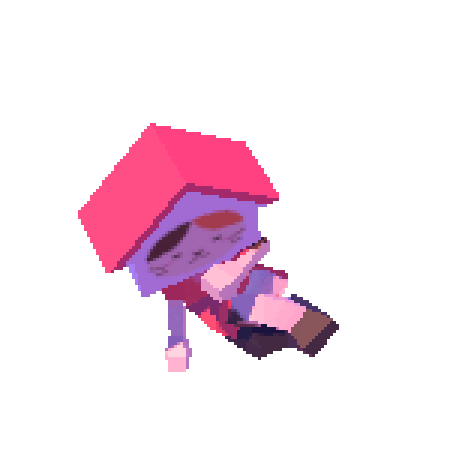
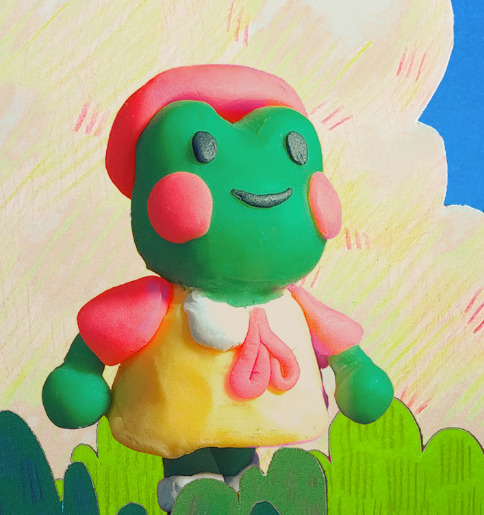
you can check the steam pages on those games for more info if u like. i love all my characters but i don't usually make personal art of these two since i already do it as my job.
my newest Smarto Club character is a bit different since she's more in the style of what i'm doing personally so i want to make more art of her soon. her name is Abigail:

she's a kid who likes reading about bugs and catching them but she never hurts them : ) this is a short game in early development but it's about catching creatures called angels. it's got horrorish vibes but i don't think the end result will be full-out horror, since it's also kinda silly...
then there's Peklo, it's a game for which i created the whole concept and story but the plan is to develop it as a studio at Smarto Club. i wrote more context for it on this post, but for the characters, they're my favorites to make art about at the moment. the main ones are Kiku (the cat) and Mi (the bunny):
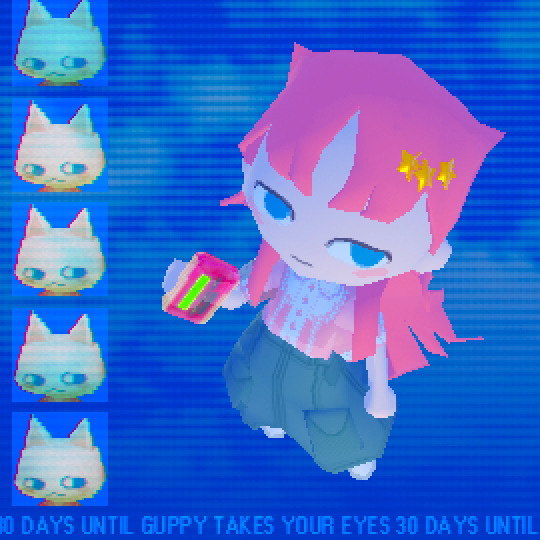
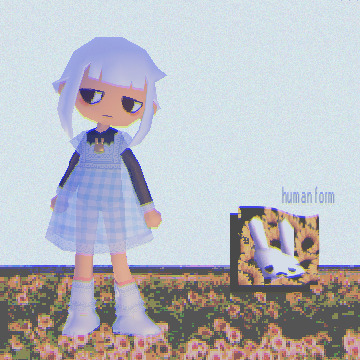

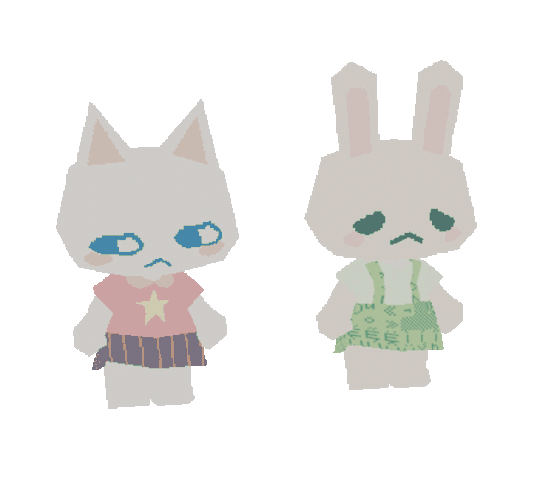
i recently created these human forms of them for fun but i'm not sure whether i'll establish them as canon or not... they're trapped in limbo/hell so there's space for them to have a past human form. they don't remember their lives but Kiku feels a deep sense of regret about things unkown to her and wants to break out of Peklo. Mi feels trapped in an eternal sadness, she longs to see the ocean, she can always hear it but has never been able to reach it.
the antagonist in Peklo is a frog entity called Guppy but i haven't really shown him outside of his froggy logo

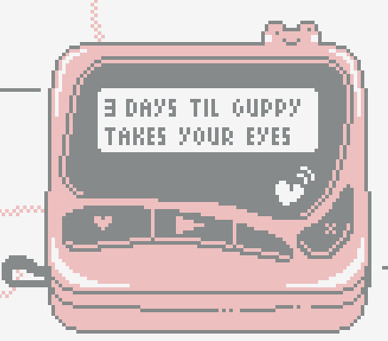

i also have OCs from my smaller games. there's Hlina that i created specifically for >this game that was commissioned to me for a zine. i don't have any plans to use her again for now but i might make more art of her in the future for fun. she's part of a strange dream realm and is hostile to the player:


there's iro from the >game with the same name who's my oldest game OC. i created that bitsy game for her story but she existed previously in my art degree final project, it was a version of the same story but just a section of it. it's a dream of mine to create a full-fledged 3D game for her some day.
she's a bit of a defective space exploration robot, sent to explore planetoid Iridium-3 in search of human contact. it's set in a future where humanity has dispersed among the whole galaxy so lots of groups have lost contact with each other.

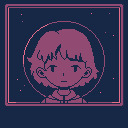
my latest game OC is Michtat, a wizard cat that i created just for this silly zine.
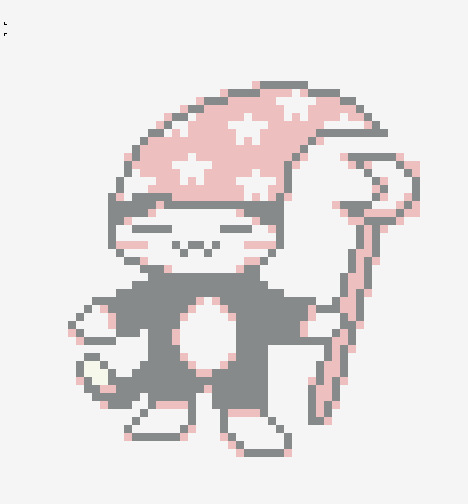

lasty, there’s the characters from my comic that I’m working on, called The most distant planet. the main characters are Victor and Mitya, two 9 year olds whose families end up living together.

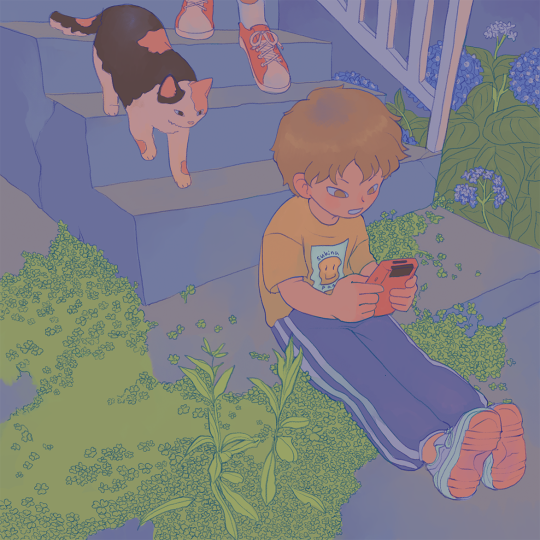
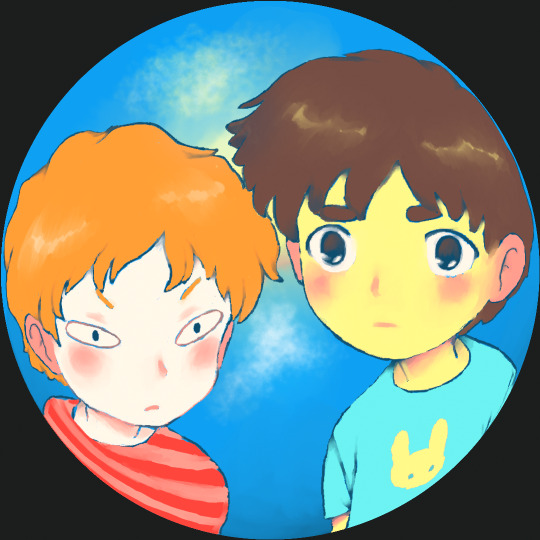
i'd say these are the dearest characters to me of all. i don't post as much of them because they're mostly in the shape of comic pages and it doesn't spark as much interest as my games. i love drawing them though.


they’re both little weirdos who isolate themselves and don’t fit in much with other children, so the friendship they develop is very special to them. they have almost opposite personalities where Victor (darker hair) is very shy and dorky but also very sweet to everyone, while Mitya mostly gives 0 fucks about what anyone thinks or says, he blurts out whatever he’s thinking and just wants to run around wild.
the story is mostly slice of life-ish but there’s also a science fiction element ^-^ Victor is obsessed with things like ghosts, aliens, etc but Mitya thinks it’s all just dumb tales.
another important character is Alyosha, Mitya’s 17-18yo brother. he doesn’t know how to talk or relate to his little brother and is kinda weirded out by him. they where very close when they were younger, but when Mitya was 2 he had an accident that Alyosha feels guilty about, and has been somehow different ever since.
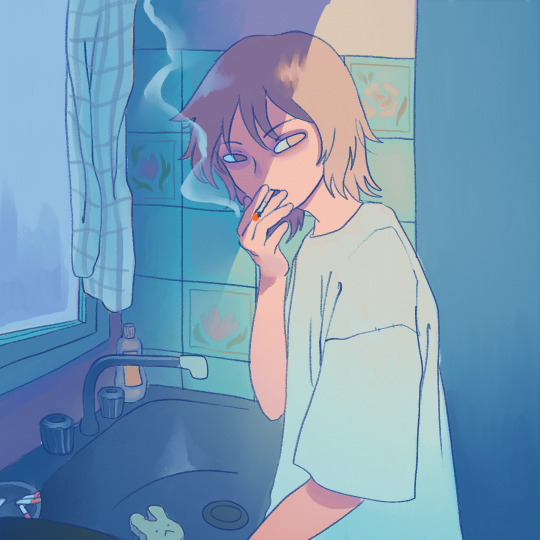


he still worries about his little brother and how isolated he is, though. at the beginning of the story the two of them live alone with their grandma who does love them but has kind of a cold and distant personality.
Alyosha was the type of kid to be considered “gifted” but now feels completely burnt out and had to repeat a grade at school. he felt so humiliated by this he eventually stopped going entirely, so he now works part time and just studies at home. he cut contact with his old classmates but he still has 2 best friends from the last few months he spent at school in the grade below, Manon and Min Na. they’re the kind of friends who just show up unannounced at his house and job, and are very involved with his family’s life.
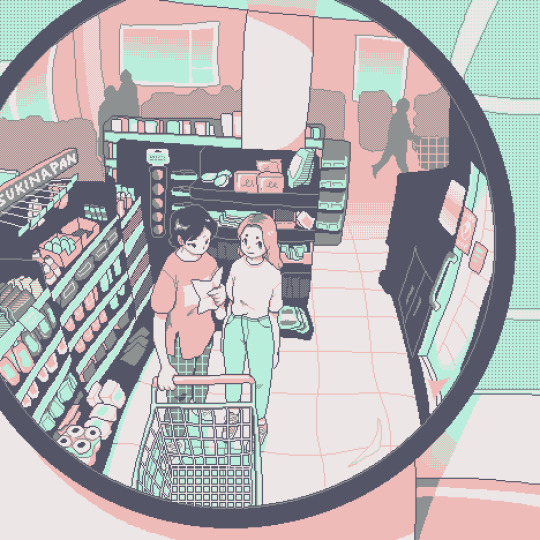

i’ve also included Min Jie in some art, she’s Min Na’s younger cousin and comes into the story later:
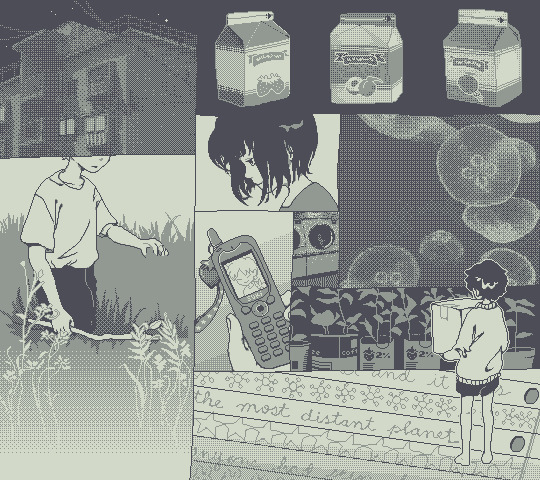

i should have like character sheets and stuff for all of these OCs but i’m the kind to just jump head first into drawing/modeling lol, that's why i included all these finished illustrations.
i really wanna publish this comic, i’ve been working on it for a long time and i’m currently waiting for the results of a public funding application here in my country to decide what i'll do next.
hope this could be of interest (^人^) thanks for the ask!
284 notes
·
View notes
Text
Thinking about Mitya and Ivan
I think a lot about the unexplored dynamic of Mitya and Ivan. There is so much potential there, yet we only have the pieces.
Imagine being Ivan and meeting your half brother for the first time. You didn't know he existed until recently, he's practically a stranger. His manners are rough, he drinks, he makes scenes, he's debauched, just like your father, who made your mother suffer. He throws around money when you have to work to sustain yourself. It saddens me, but I can understand why Ivan dislikes Mitya so much.
But Mitya is no buffoon: he holds respect for Ivan and sees him as superior to him, even if part of it comes from his own self- pity. He's not the brightest, but he appreciates education and smarts when he sees them and wants to know what's on Ivan's mind.
Mitya is most likely eager to make a connection, but the obstacle is exactly the source of the personal pain in both of them and the only thing they had in common from the beginning, their father. Ivan pushes away those he cares about, but he can't escape Mitya, who will keep seeking attention from people and taking them for granted even when he knows they don't like him. And Ivan is too proud to not put up with it. This dynamic is a goldmine.
Ivan's relationship to both Pavel and Mitya is the answer to why although his idea has not been refuted, him as a person with prejudices had his downfall. In Mitya is the bestial man who was once one of those weeping children.
Mitya, a body aware of the mind, and Ivan, a mind aware of the body, as some critics say. Mitya, who would love God from the depths of Hell, and Ivan, who returns the ticket even in the face of salvation.
Perhaps they do have more in common than they think. I believe readings of Ivan as the rational one are very reductive, when his rejection of harmony is a question of his feelings towards the suffering of the innocent. His passions are bubbling under the surface. Both grapple with the tension between their pathos in front of reality and their unexplainable love for life, they have questions about sin and salvation expressed in different ways. Ivan presents the idea that if there is no God, everything is permitted, and Dmitri echoes it as a question that receives no answer. Even when Ivan became a representation of the intelligentsia and "Westernised" himself, he knows the eternal questions still plague his mind. Mitya barely thinks about God, loving God seems natural in him, and Ivan may think about God more than anyone else.
Despite their not- so- perfect relationship, it was Ivan who in the end dragged himself to court and claimed to be the guilty one, it was Ivan who came up with an absurd plan to free Mitya, and doing so he showed that he cared more than any of Mitya's relatives, who did absolutely nothing to help him (except for Alyosha, who could at least offer emotional support). It's almost poetic: the culmination of a relationship that was damaged from the start, as "Free the monster!"
Note: Their relationship to Katerina is also an essential piece to their dynamic, something that takes even more to explore and that I hope to see more clearly in future chapters of my fic, as well as the Ivan- Mitya dynamic I talked about here.
For now this is all I'll say about them.
#the brothers karamazov#ivan karamazov#dmitri karamazov#mitya karamazov#I..... love them so much........
159 notes
·
View notes
Note
Lock, what DO you love and like so much about Dostoevsky's work? I don't think you've ever talked about that. Please, I want to know !!!
^o^
(christianity mention jump scare below proceed with caution)
i thought this would be an easy to answer but figuring out how to put my feelings into words proved difficult .
the beginning is always a good place to start, so let's go with that. by chance, i happened upon this video on youtube and gave it a watch. about halfway in i decided i had to read notes from underground for myself. i struggled to understand what the narrator was trying to get across. the unique writing style, where the reader is addressed directly, as if in challenge, helped me preserve.
i think part of what makes his work special to me is his depiction of people. and they really do feel like people more than characters, even if some of their characteristics are unique to the era dostoevsky wrote in. everything else about them transcends time. i can see myself in some of them. whether it be the titular idiot, prince myshkin in his naivety; alyosha, who goes from devout to doubting; and ivan, whose bitterness toward religion masks his disappointment at the state of the world.
that's why the brothers karamazov touched me in particular. for some context, i grew up in a christian household and was heavily involved in the church (american northeast white baptist strand of church). around when i was 11 or so, the introduction of left-wing politics through social media had me undergo a looooong identity crisis. these new ideas felt at odds with what i'd spent my entire life believing. what i grappled with the most relates to ivan's anecdote, the grand inquisitor, where the goodness of god is called into question. the bitterness, the disappointment from crushed expectations, all those sensations resonated strongly with me. reading it as an adult who (supposedly) 'healed' from that time period in my life was like opening pandora's box. i'd never seen my thoughts and struggles so accurately described, or treated with more than a 'his ways are higher than our ways' type platitude. i stuffed these concerns of mine away because they only ever served to make me feel worse.
i won't delve deep into the Depressing Lore. the only reason i mention it is to stress how profound an impact the work had on me. throughout the remainder of TBK (and in most of dostoevsky's discography), the best and worst of humanity is shown. our hypocritical nature, capacity for evil; nothing is shied away from or made more palatable. and yet, throughout it all, our potential for good is shown too. whether it be in the little acts or monumental self-sacrifice. sometimes those acts are honored, or ‘worth it,’ sometimes they aren’t. it’s cheesy but whatever i’ll say it — choosing to love and serve others is my greatest joy. i don’t really need a definitive answer to those problems i struggled with. that’s the takeaway i’ve had from his work. it might not seem like a big deal, but not feeling guilty for having certain doubts or anxious over those doubts never fully being resolved was. very significant for me. and healing (for real this time).
so that’s the sentimental perspective GJSDLKFJS from my writer’s perspective, i can only describe him as brilliant. his grasp on the human psyche is incredible. he can accurately describe so many emotions, worldviews, and give the context necessary for each one to feel organic and real. it’s vivid, too, in a way i can’t properly get across. everyone’s unfiltered and messy. characters contradict themselves in the same sentence. they’ll murmur, go off on tangents, tell stories, misquote the bible (or many other significant works), and just be overall disasters. aka how people actually are.
the man’s also funny as hell. the protagonist from crime and punishment has a mental breakdown spanning multiple pages over a sock. yes, there’s context, but that’s still the gist of things. then there’s the issue of the hedgehog in the idiot. hedgehog drama.
ultimately, his work is so very human. there’s commentary on issues that are prevalent to this day, multiple centuries later. the topics he touches on tend to align with what i care about most. whether i agree or disagree with what i’m reading, there’s always something i glean from it. something meaningful that sits with me long after i close the book. i’ll mull over it and bother people in my vicinity until they mull over it too. no one is safe. whether it be a co-worker or my dad who drives noticeably faster to reach our destination and be free of my many questions.
i could keep going but this ended up being long enough GJSKDF i hope at least something here makes sense?>?? i apologize for the incoherent ramblings. it's what the dude does to me.
69 notes
·
View notes
Text
13 years after the events of the book ivan is a somewhat famous journalist, probably due to some controversies. he's rushing off home after a dull work of editing.
he's been feeling overall depressed in the past few weeks. he's trying to write down the great inquisitor once and for all, but deep down he's concerned about the critics and his own skills. mitya and grushenka are nowhere to be found, alyosha is up in the mountains teaching little kids the abc. he's got no friendly faces in moscow.
he sighs and takes a turn, when all of a sudden he bumps into someone coming from the opposite direction. he ends up on the ground. the first thing he notices are flowers - yellow flowers scattered on the ground. then an all-too-familiar scent of milk and honey. the stranger apologises, lands out a hand, and before his eyes look up his heart has recognised her.
her face seems more tired, a few silver strands peek through her hair, but her charm hasn't left her. katerina is still as beautiful as the day he'd left her. screw the articles, he thinks, and in a matter of seconds he's invited her for a drink.
they catch up, talk about family business and reminiscence the past. she's married. they've been trying for a child but no use. he's all by himself in a big apartment on the sadovaya. seldomely gets visits, never from the people he'd like to see. some things are just meant to be this way.
she's read one of his articles. two, actually. maybe three. perhaps a bit more. there's even a possibility she's cut them out and kept them at the bottom of a drawer next to her bed.
well, if she knew he was in town all along, why didn't she drop by to say hi? they hadn't left on good terms. to be honest, their last goodbye was pretty cold - almost indifferent. she thought reaching out for a stranger was not right. and quite frankly, she was still way too prideful to make the first move, though she never would've admitted it. they were older now. one would expect them to be wiser too.
how about they try again?, he proposes. two seconds later he's already regretting it, but he decides to blame it on the alcohol he's barely touched. she seems hesitant, so he promises to show her a secret project he's been working on as a proof of their renowned friendship.
he leads her to his apartment and she's the second witness ever of his cursed poem. she reads the first page and he's sweating like a sinner in church. she makes herself at home and sits down on the divan, completely immersed. at page five she stops. could he read it out loud for her? it'd be much more impactful. matter of fact, why doesn’t he turn this into a play?
ivan doesn't answer, just complies. she's back with her tortures, but he can't understand why. when he's done he's almost afraid of looking back at her. she's staring at him in awe. she's always known he was one mess of a genius. to think that she'd always despised chaos... what exactly did he do to her?
he should turn it into a play, that's her final statement. a wonderful play with splendid costumes and the best actors of moscow. she can help with the money. she can even help with the editing. it feels good to help, to see right through and not to look away - and this time it's not martyrdom, no. it's something more genuine to inspire her. it's almost love.
#KATERIVAN FANFIC DRAFT I PULLED OUT OF MY ASS AT MIDNIGHT OUT OF SHEER DESPERATION#all for you#ruslit#tbk#the brothers karamazov#dostoevksy#russian literature#ivan karamazov#katerina ivanovna verkhovtseva#katerivan
47 notes
·
View notes
Text
On incommunicability
I saw a post that mentioned how Ivan is so radicalized by child abuse and yet hates Pavel so much and I want to talk about it because I genuinely think about it a lot (I clearly have issues), but I'm making my own post because I don't want to randomly come rambling into a stranger's notes.
I've said it before, but Ivan is a paradoxical (I mean, other characters refer to him as such multiple times) person and that's exactly what I love about him and the dynamic between him and Pavel. In theory he wants to help people and in some instances he does, such as the whole making Dmitri escape prison situation and his encounter with the peasant in the snow, but when he has to get emotionally close in order to do so, like he would have had to do with Pavel, he doesn't. Ivan was the only one who could have helped Pavel, except he couldn't because he has issues and can only interact with others and love at a distance.
The difference between Dmitri's situation and Pavel's is that when it comes to the former, Ivan can still act at a safe distance and even through Katya and Alyosha, so it's not an emotional ordeal. There are a lot of feelings at play in this kind of situations and feelings are not something Ivan is good with, and I think it makes sense for him to feel such rage towards Pavel simply because that's what Ivan turns any feeling he doesn't know how deal with into, so I wouldn't exactly call Ivan a hypocrite as I think it's more complicated than that; pushing away people is all he does and it's coherent of him to do so with Pavel too. To me it also makes sense for him to fail to see the suffering children that the adults around him once were, as absurd that may seem. It's all about rage and the blindness that comes with it.
It's important to highlight that it's explicitly stated that even Ivan himself doesn't know why he feels so angry towards Pavel; I've always wondered about the background of Ivan's change of attitude towards him, considering they used to have a civil relationship and it's mentioned that they used to have intellectual conversations as well, and honestly I think it's because of Ivan and his comfort zone: when things become too much, he distances himself. It's obvious that he knows what his brothers' childhoods were like, he even brings up the suffering of children at lunch with Alyosha, he knows that it ties them all together and that knowledge, on top of the abuse, has impacted him deeply. Having Pavel keep trying to get closer angers him even more and, personal opinion here, it reminds me of the way Fyodor tries to get Ivan to talk to him in some passages of the book. On the other hand, Pavel tells Ivan he's just like their father because to him Ivan is in fact just like their father: another person who discarded him. And it all stems from a deep mutual misunderstanding.
I can't really condemn Ivan, just like I can't really condemn Pavel (or Dmitri); they're a product of their environment and to me The Brothers Karamazov is also a book about misunderstanding and incommunicability: sometimes there's just some sort of invisible barrier between family members that nobody can really do anything about, and sometimes you find yourself in something that is so messed up, so tangled and so much bigger than you that you just don't know where to start to fix it (you can't, not alone at least) and I hope you get what I'm trying to say as it's difficult to explain the very specific and complicated mechanisms and feelings in such dysfunctional family dynamics.
I've said before that I don't consider Ivan's character and story tragic and while I still stand by that, this is to me the tragic thing about him: he, who has empathy for and wants to help those who've been abused, could've done something to actually help a (now grown) abused child close to him, in his own family, but couldn't even try due to being emotionally neglected (and therefore a now grown abused child) himself. In the end his inability to break the cycle, which is itself part of the cycle, digs his own grave and that's incredibly fucking sad.
#I tried to be as clear as possible without revealing too much of my own tragic backstory sorry#also this might be bullshit if it's bullshit let me know I'll probably delete it idk#oh and don't get me wrong in my mind Ivan recovers so his story doesn't end tragically#but how the fuck does someone deal with the aftermath of whatever that shitshow was y'know#send him to therapy#actually send them all to therapy#the brothers karamazov#ivan karamazov#pavel smerdyakov#thoughts#mine
20 notes
·
View notes
Text
(SPOILERS for The Brothers Karamazov, The Idiot, and Crime And Punishment)
Major Themes in Dostoevsky’s novels: Russia, Loneliness, Faith, Love, and Redemption
// this is rough, transcripted from an audio recording and only slightly edited. if anyone wants to talk to me about this, please do!
After finishing Crime And Punishment, Notes From Underground, The Brothers Karamazov, and The Idiot (working on Demons currently), I’ve been thinking a lot about the larger themes and concepts that tie Dostoevsky’s works together. Although many of his works are different, I’ve noticed- at least, in my interpretations- that they carry key elements which are integral to understanding and digesting his writing.
Beginning with Crime and Punishment; my first Dostoevsky, and the novel which began my odyssey into his masterful worlds. (this section may be more flawed than the others, as i’ve read it about a year ago) C&P, at its surface, is about the folly of man- inflated ego and its effects on humanity. Raskolnikov likens himself to Napoleon. He believes that he is destined for a greater cause, and he kills because of that deep desire for greatness. But it’s not difficult to grasp that he is truly nobody; he kills for no actual reason, and his crime is simply a crime of hopelessness. And he knows that, and it scares him. In fact, knowing he has no true motive scares Raskolnikov more than people realizing he’s the murderer. Dostoevsky’s characters all seem to represent certain facets of Russia. (my knowledge of Russia in Dostoevsky’s time is limited, so i apologize if I get this completely wrong..) What Raskolnikov feels while nervously roaming the lonely streets of his town is what is occuring in the minds of the Russian people as a whole. When it is concluded that Russia at the time is a lonely, confusing, morally corrupt nation, it becomes more clear how Raskolnikov connects to this greater idea. Many crave to be different, to distinguish themselves from the crowd, to prove that they are just and for a good cause, but truly- as i think Dostoevsky sees it- they’re not. And they cannot run away from that. This becomes more problematic and is heightened when they are forced by societal standards and needs to push their disillusionment down instead of being able to voice them.
Another important theme to consider is redemption and forgiveness. Raskolnikov achieves this at the end of C&P when he is put in Siberia for his crime. (important!!) This concept of forgiveness is integral to Dostoevsky’s faith, which is depicted shamelessly in many of his works. Everyone deserves pardon from their sins if they accept it- everyone is capable of it, too. Raskolnikov finding God in Siberia is extremely similar to Dostoevsky’s experience. He doesn’t shy away from embedding his own experiences into his work. Christianity is important to him. Not wholly because it’s the “correct” way to believe, but because it helps quell the loneliness and feelings of corruption which one may feel in his Russia. It provides an escape, a meaning, a love which can save and teach and inspire goodness in a world which instead inspires much evil.
In The Brothers Karamazov, you see some of the same Christian ideals. There’s Alyosha, who’s a holy beacon of light; though he’s also flawed in his own right, owing to the concept that achieving goodness is a constant pursuit. This is similar to Ivan’s journey, who has the idea that “everything is permissible,” and because of this he inadvertently causes his father’s death. Once again an act of murder on Pavel’s part with no real justification- stemming only from his own loneliness and abuse. Ivan lives a faithless life, focusing on the bad and denying god because of the very real unfairness he sees in the world around him. Though Dostoevsky allows Ivan to make his convincing case, he shows us how this view can falter and lead to only more violence and corruption. The most convincing example of Dostoevsky contending Ivan’s argument is with a scene of redemption at the end of TBK once again. Alyosha talks to a group of young boys and tells them about the importance of respect and friendship, of youthful vitality in loving freely. The children praise the Karamazov name, showing how an act of kindness can overcome the past difficulties and pain in the Karamazov family. Of course, the Karamazovs serve as a symbol for the entirety of the Russian people. Love is the savior- love for God in many cases, love for the people around you, love for the world even through its darkest moments. In a cast of extremes- an extreme athiest in Ivan, who lets his love for the world grow so hurt that it turns inro a hatred- an extreme lover of God in Alyosha, who lets his love blind him sometimes, in Smerdyakov who has never felt love and kills because of it, and an extreme obsessor over romantic love in Dimitri, which overcomes him and drives his every action, Love works in mysterious ways. It consumes the world, but there is a way to harness that love and make it into something truly good and beneficial.
Lonliness is something which blocks this love- and this ties into The Idiot. The cast of The Idiot is a cast of lonely people who find themselves constantly separated from the people around them, unable to connect because of the world which they live in that seems to breed more hatred and contempt rather than true understanding. Prince Myshkin has led his whole life essentially alone, apart from Russia due to his bad case of epilepsy (could this be a reason for his purity? Yes, probably, if we’re sticking to the idea that Russia corrupts its people) and with little outside interaction. Near the beginning of the book, Myshkin reflects on a time living in Switzerland when he started to see a lonely woman because he only wanted to lend her some companionship, not out of romantic love but out of his own great compassion to help others escape the loneliness he feels. Myshkin goes on to meet a cast of characters who, despite being (debatably, but not as physical as his illness) mentally healthy, are just as lonely as he is because Russia is, once again, a lonely place. Then there’s Nastasya, who’s been abused and sees herself as incapable of being and receiving love due to her being “tainted.” The Idiot serves as Dostoevsky’s darkest book because he does not provide redemption for Nastasya. Her loneliness has consumed her so fully and she will not allow the love into her life that she needs to survive. In the same way as Myshkin started to love the woman in Switzerland, Myshkin falls in love with Nastasya, in a wild pursuit to save her. Unfortunately, this tactic of his does not work. It actually ends up all falling apart because of jealousy. But Dostoesvky does provide a concept of a way out, though it’s less articulated- and it’s Myshkin himself. Myshkin is more of a beacon of light that Alyosha. He’s that true barrierless acceptance and childlike loving which is sparse in Russia and powerful in its capablity. By applying that Myshkin mindset to yourself, it is a way to be happy and make others feel happy aswell. But Myshkin is hurt by the people around him, who abuse him for his purity and laugh at his goodness, only because they are afraid of what they have never seen before. Dostoevsky shows (mirroring Jesus’ demise) how the Myshkin mindset ends in punishment, suffering, and injustice, because the world he lives in cannot accept that part of him. Maybe some semblance of redemption is possible, but embodying the Christian ideal and being truly authentic to your inner goodness will oftentimes lead to pain. Continue loving humanity through that. One can only hope that in the afterlife you will be rewarded. Maybe that is the ultimate redemption.
// i want to talk about A LOT more considering christianity, dostoevsky’s usage of provinces and gossip, and i’d love to be more historical in general. probably will rewrite this all when i finish demons, but this is it for now
#dostoevksy#dostoyevsky#russian literature#the idiot#the idiot dostoevsky#prince myshkin#the brothers karamazov#tbk#alyosha karamazov#lev myshkin#crime and punishment#rodion romanovich raskolnikov#rodya raskolnikov#alyosha#ivan karamazov#mitya karamazov#nastasya filippovna
11 notes
·
View notes
Note
Hello there. If possible, do you have any headcanons about horseback rider / horse girl / equestrian / Cinnabar? Since Cinnabar has a white horse with her while in her Courteous Call / Regards skin (https://www.youtube.com/watch?v=6bPy_yLZvHY-), I thought about asking this question. Personally, I think Cinnabar would take F!Chief on horseback riding dates, maybe even performing a few Dressage techniques for F!Chief. What do you think? Thank you too! :)
Here you go anon, sorry for the wait! Honestly, this request reminded me of how much I miss riding myself; I had a lot of fun with it!
Equestrian Cinnabar x F!Chief
Cinnabar and Chief have been dating for a while, sharing an apartment in one of the lower income areas of Eastside. They don’t have much to their name, but it’s enough to live a comfortable life, and they’re happy.
Chief works at the local police station, though she’s getting more and more unhappy with her job by the day as the rate of corruption continues to steadily increase. Cinnabar works for a private security firm, and while she doesn’t seem as discontent as Chief herself is, she can still notice the seemingly-eternal exhaustion in the eyes of her dearest.
One day, Chief comes home from work to see Cinnabar reading a letter with wide eyes. Worrying that it’s something bad, Chief asks about it; with amazement in her tone, Cinnabar explains that an old friend of her father’s wanted her to take over her family’s horse ranch.
Chief had no idea that Cinnabar’s family owned a horse ranch; her girlfriend had never mentioned it before. Naturally, there was no end to the questions. It turned out that Cinnabar had grown up on her family’s horse ranch, and her father had fostered an avid love of riding in her. When her father died, some of her spark for equestrian did too. Her father’s best friend, Alyosha, took over the ranch, and a teenaged Cinnabar continued to ride for several years, competing in many competitions and winning no shortage of prizes. She was the pride of everyone who lived and worked on the ranch… but eventually, that hollow hole in her heart became too much, and she moved away to study at a police academy.
The two deliberate for a long time over whether Cinnabar should accept Alyosha’s offer, as she’s still hesitant about returning to the ranch after such a long time. Eventually, Chief manages to convince her; both of them are clearly falling into a rut with their current lifestyle, and perhaps, after so long away, some of Cinnabar’s wounds may have healed.
The two pack up and prepare to move that weekend. It’s a several hours long car ride out to the countryside, though Chief ends up taking over the driving no less than an hour in, noticing that Cinnabar is jittery and distracted.
Chief had half-expected Cinnabar to immediately head for the stables upon their arrival, but that wasn’t the case. Instead, she brought Chief inside the main house to give her a tour; it seemed like the house hadn’t changed that much in the years she’d been gone. Cinnabar’s old bedroom was almost untouched, and the two moved into it.
Chief was also introduced to the others on the ranch. Alyosha was a strict man and she couldn’t help but feel like he was judging her closely, but she could also tell that he and Cinnabar were very close.
The other ranch-hands were a lot friendlier than Alyosha, and they all seemed to perk up upon learning she was Cinnabar’s girlfriend. They offered to give her a tour of the rest of the ranch while Cinnabar spoke with Alyosha, and their questions and teasing were pretty much endless.
It wasn’t until the next morning that Cinnabar returned to the stables. Waking up at around six AM, Chief noticed she was alone in bed. Heading out to the kitchen, she was given some toast and coffee by a friendly ranch-hand and informed that Cinnabar had gotten up to do chores two hours ago.
After finishing breakfast and thanking the ranch-hand, Chief headed out to the stables, which she couldn’t help but notice were at least twice as clean as they were yesterday. Some of the other ranchers working in the stables already helpfully directed Chief to one of the end stalls.
When Chief first saw Cinnabar grooming the proud white stallion, she couldn’t help but stop in her tracks, breath caught in her throat. Cinnabar was dressed in full riding gear, gloves to boots, a hand on the horse’s neck as she murmured softly to it. Though Chief couldn’t make out the words, she recognized the affection in her girlfriend’s tone; Cinnabar was nothing short of resplendent.
The horse noticed Chief, its ears flicking; noticing, Cinnabar turned to see what had gotten its attention, and blushed right away. “C-Chief, I wasn’t expecting it to be you. I thought you’d sleep in more.”
“Couldn’t help it. My bed-warmer was gone.” Chief made a joke to try and cover up how flustered she was, hesitantly stepping closer. “You look like you’ve found where you’re meant to be, Cin.”
Cinnabar blushed deeper, and distracted herself by introducing the horse to Chief. His name was Knight and he was the horse Cinnabar had been riding since she was little; though he was getting older, he was still the gentle and regal soul he had always been. Cinnabar encouraged Chief to let Knight smell her hands, and then gently pat him; indeed, Knight’s response was quite agreeable, and he seemed to be enjoying the attention.
Despite the full riding gear, though, Cinnabar didn’t take Knight out to ride. She instead attached a lead rope to Knight’s halter and walked him around the paddock. Chief could tell that Cinnabar was still hesitant about riding; she wanted to help, but wasn’t sure how, so she resolved to simply support her girlfriend.
It took about a week for Cinnabar to finally decide to try riding Knight again. During this time, Chief had been slowly adjusting to waking up in the wee hours of the morning to head out and help Cinnabar with her chores. She’d actually yet to ride any horses herself, but she liked to think she was good at mucking their stalls, grooming and feeding them, and cleaning their tack and whatnot.
Cinnabar had been hesitant while putting Knight’s tack on, but as soon as she sat astride the saddle, she was all confidence and poise. Later on, Cinnabar explained that horses were very in tune with their rider’s emotions, and she hadn’t wanted Knight to be affected by her lingering uncertainties.
Cinnabar walked Knight for a few laps around the paddock to warm up, then a trot, then a gentle canter. It wasn’t anything particularly incredible – no galloping or jumping or any amazing equestrian feats. Still, Chief couldn’t help but note how absolutely at home in the saddle Cinnabar looked, and she knew that this was where her girlfriend truly belonged, not in the big city.
After about a month on the ranch had passed, Cinnabar invited Chief to go trail riding with her, and she was more than happy to accept. She was breathless in awe at the scenery – her girlfriend had taken her on a trail that wound down by the shore of a large lake with pristine waters, one impossible to reach by motor vehicles. The leaves on the trees were just starting to turn colors, too, creating a picturesque view that Chief knew would be seared into her memory forever.
Of course, her favorite part was by far feeling her back pressed up against Cinnabar’s chest, basking in their shared warmth. It was an extremely close and intimate feeling, and despite having never ridden horseback before, Chief had never felt more safe and secure than in this moment.
It had become apparent by now that Cinnabar would indeed be taking over the ranch, so the riding trails became a date the two of them went on every weekend, weather permitting. Chief was in awe of the sheer amount of hidden trails tucked away in the countryside, and just when she thought she’d gotten a grasp on one of them, Cinnabar would reveal a new shortcut or secret path, once again reinvigorating her with a child-like wonder. Of course, her favorite part was always spending time so close to Cinnabar.
After about a month or two on the ranch, Chief could see that Cinnabar was back in the saddle as though she’d never stopped riding in the first place. Chief often found herself leaning against the fence of the paddock, watching as her girlfriend made complicated jumps look like child’s play, or left the times of the other ranch residents in the dust during any sort of race.
One of the ranchers informed Chief that Cinnabar had been quite the dressage star in her youth. Chief wondered if what Cinnabar had already shown her didn’t count as star quality anyway, but her curiosity got the best of her and she ended up asking her girlfriend if she could see some techniques. Cinnabar was embarrassed, but obliged. As soon as she saw Cinnabar performing even basic dressage, Chief forgot how to breathe; she’d always thought Cinnabar and Knight were incredibly in tune, but now it was as if they moved as a single entity. Steed and rider, there seemed to be no difference between the two, and Chief found herself spellbound by the graceful dance of dressage, the ultimate understanding between two companions. It quickly became a delight to watch Cinnabar put on private dressage showings for her; if Chief had had any doubts that Cinnabar belonged on the ranch, they would’ve long been dispelled.
Cinnabar eventually offered to buy Chief a horse of her own, and Chief said she’d think about it; however, the truth was that she really couldn’t see herself as an equestrian at all. Riding in the saddle with Cinnabar and helping her to take care of Knight… It may not be the typical idea of life on a horse ranch, but it’s the only life Chief felt like she needed. And, at the end of the day… Both her and Cinnabar were happier than they’d ever been.
#ptn#path to nowhere#ptn cinnabar#path to nowhere cinnabar#cinnabar#ptn headcanons#path to nowhere headcanons#headcanons
23 notes
·
View notes
Text
1.5 Starsty
Ivan seeks something unknown as of yet, Mitya seeks life's pleasures and what he's owed (a self- affirmed truth) and Alyosha seeks a bright truth quite beyond the dark world around him, as if he had found himself in Plato's cave. I expressed his love for humanity and desire to isolate himself are paradoxical -and they still are, though they are not contradictory. What Alyosha seeks is a truth via negation. The world of our senses is more complex and dark than it seems, the holy light is one, and it's simple yet mysterious. The achievement of the divine truth via negation -God is an other quite unlike the world and what we believe to be true about it. Alyosha seeks a truth at all costs, and if he ended in the monastery, it was only because the way he thinks made him a Christian, rather than his religion or a miracle shaping how he thinks. That's how he is a realist. The moment he reaches a different conclusion, he will chase it, no matter how diametrically opposed it is to his life so far, just as he decided to give "all" instead of "two rubles". So if the immortality of the soul proved to be the truth he arrived to, he will remove himself from the chaos, out of conviction and not fright- to be left alone with the light and contemplate it.
Shutting himself in a monastery despite his love for humanity is paradoxical, but necessary in his eyes... Just as there is paradoxical tension between obedience to the elder and freedom, with the former being seen as necessary to achieve freedom of the soul, as it is in many philosophies and doctrines that regard ignorance and endless desire as the true prisons of the human soul. Alyosha was compelled to go to the monastery out of admiration and love towards Elder Zosima, perhaps a father figure for this orphan? Far from being disconnected from the world, he is a man of the people who remains unbothered when Fyodor Karamazov is going to call at his door.
Alyosha is passionate about what he believes to be the right path, but he's still just a novice who feels anxious upon realizing he may be forced to become a spectator for the scene his relatives will make in the place he holds dear to his heart. Ivan's silence deeply unsettles him. Even Dmitri, who became more attached to him than his own full- blooded brother, worries him— as much as he respects his beloved Zosima, he's as powerless as he is to prevent what will follow...
--------
Links:
@keepingupwiththekaramazovs
#I wish I could add some info about apophatic theology but it's not easy to find something reliable and easy for everyone#keeping up with the karamazovs#tbk 1.5#entry#character: alyosha#tbk book club#topic: theology#topic: psychology#topic: religion#book 1
11 notes
·
View notes
Text
This will be my worst post but fuck it. If you’re absolutely DETERMINED to take it there then Smerdy/Ivan absolutely BODIES Alyosha/Ivan in terms of narrative/characterization/dynamic/motif and theme/basically everything else that matters. But it is really not about that for the vast majority of people who are deadass about shipping yaoi from a Russian novel published in 1879. All the IvanYosha stuff seems like it’s really more about getting your rocks off on AO3 and drawing two conventionally attractive anime twinks kissing. To which I wonder why you wouldn’t pick literally any two characters from any media for that unless you’re just into incest or something.
I really love the Grand Inquisitor kiss! And I don’t like seeing it interpreted that way!
On the other hand something that drives me insane about my personal interpretation of the book is the juxtaposition between the Alyosha Ivan kiss vs Ivan’s general disgust for Smerdyakov. Why is Alyosha kissing Ivan a pure, innocent expression of Christian love for all humanity but Smerdyakov’s gesture of love (killing Fyodor) is something so perverse and horrifying? It shows us something about their station of life through the roles and the acts that are even allowed to them in the narrative.
As far as SmerdyIvan goes I am reminded of the JSTOR article I read (that I now cannot fucking find) where the author mentioned an idea that all of Dostoevsky’s novels center around or contain one central taboo that is so unspeakable that it is scarcely even outright mentioned, and that the central taboo in question in TBK is that Smerdyakov is the fourth brother.
Incest is already gotten into in canon and much has been written about this, especially regarding Dmitry and Fyodor’s rivalry over Grushenka, but also with Ivan falling in love with Dmitry’s ex. So even though we are going far afield from authorial intent, it is really not that much of a jump to start looking at emotional incest from other angles within the family, as we already know literally every other type of abuse was already occurring within that (entirely fractured) family unit. As far as I am concerned regarding authorial intent, any claim you want to make about a work of fiction is fair game as long as you can justify it with evidence from the text, and people have been writing academic articles and essays making wild inferences from this text for the last 150 years, so I defend my right to make this interpretation. I’ve said it before and I’ll say it again, if Freud can diagnose Dostoevsky as bisexual we can say whatever we want about this book.
We know from the canon indisputably that Smerdyakov is unhealthily attached to Ivan, and we know that some vague thing about Smerdyakov sets Ivan’s Geiger counter for rancid horrific disgusting vibes to 10 immediately, anytime they are on the page together. So we can infer a lot from that.
Smerdyakov was literally born of sexual violence, and is a pariah in terms of his gender expression and sexuality, so him taking on the role of someone with a warped sexuality in the narrative just sort of… follows, in terms of the novels concern with the idea of inherited sin.
There is something compelling to me about the idea that Smerdyakov would seek entrance into the Karamazov family in another, weirder way psychologically through attaching highly inappropriate feelings to Ivan. (‘If you think of me and my feelings toward you as incestuous, then that means you have acknowledged me as a family member’)
And regardless of what I literally just said about authorial intent, Dostoevsky outright tells us how gay Smerdyakov is like every single time he’s on page. So there is also that.
Their relationship appeals to me greatly insofar as it is utterly disgusting and that’s my jam. There is lots to explore in this dynamic but one indisputable thing baked into the text between them is that it’s literally impossible to imagine any truly romantic union between them simply because of the way they both are. They repulse each other far too much for any expression of that sort. The actualization of their inappropriate relationship is not a culmination through an even vaguely romantic or sexual encounter, instead, it is the fulfilling a murder pact.
They are like two oppositely charged magnets or something, in turns attracting and repulsing one another, pushing and pulling on each other’s gravitational pulls. Regarding the Tchermashnya-Moscow conversation, the way that their conversations are in doublespeak, with words said out loud and then literally entire other sentences written out in thought and illustrated through description of physicality, is incredibly fascinating to me. They seem to be literally communicating telepathically. I am reminded of another JSTOR article I read that mentions the Dostoevskian doubles “exerting influence over one other that cannot be explained in any literal sense.” The only reason they can communicate like this is because they are doubles, and this doublism is reinforced again in the narrative by their being fake twins, the same age but born to different mothers.
They are each other’s shadows, they share a consciousness on some level, or access each other’s consciousnesses at different times through this shared plot in a way that seems incomprehensible to both of them. And Smerdyakov, in my own interpretation and opinion, as someone who is completely starved for any kind of positive regard, takes this for love. Whether that’s familial or otherwise or both.
They engage in this mutual seduction towards an ultimate goal or realization: Ivan presents the idea, that “all is permitted” and that perhaps it would be for the better if Fyodor were dead, and Smerdyakov takes his lead from this and in turn pulls Ivan into the murder plot. Their relationship is romantic insofar as they are seducing one another in turn towards this unspeakable and forbidden act that they both desire: the murder.
They deny it right to each others faces, only Ivan’s is an earnest denial, to himself first and foremost, and to Smerdyakov it’s just sort of… foreplay. Like, “we’re just two clever people who are only saying this because we have to, and we get it, and you’re in this with me.”
There is something really compelling too in the fact that Ivan is on board with the murder plot in one scene on a subconscious level, but later will utterly deny that any of this ever happened or that he ever felt that way. He has expressed and betrayed a desire that is so deviant, so forbidden, and so distressing to him that he has a psychological break over denying that that could have truly been something he wanted. Ivan expresses overwhelming disgust and disdain through the entire book, mostly towards Smerdyakov, but finally towards himself when he is forced to the realization of the role he has played as the idealogical murderer. Whereas Smerdyakov, the more active pursuer in their relationship, is not ashamed of his desires and is the one who ultimately has the lack of inhibition required to carry out The Forbidden Act.
Ivan is attracted by Smerdyakov initially, despite himself, for reasons he can’t understand, like one is drawn to a cataclysmic disaster of fate in a Greek tragedy or something, and ultimately it descends into complete loathing on both sides, kills Smerdyakov, and mocks Ivan’s entire character by undermining his self concept and his entire value system and laying utterly bare his fatal flaws as a human being. Utterly doomed and hopeless relationship in every single way!
Alas, no one wants to match my freak about this and that is definitely for the better. If I had to see ship art of them kissing anime style I would kms. Whatever the fuck they had going on is way better.
#the brothers karamazov#ivan karamazov#pavel smerdyakov#fuck it im high. my worst post#george.txt#incest tw#tbk#pashaposting
49 notes
·
View notes
Text
Thinking about Ivan's statement to Alyosha --- about the 'sticky little leaves'. It's such a powerful thing and honestly it's where the book became one of my favorites, because what Ivan is saying is 'I will live for you', and that's the opposite of the very common, fierce idea of 'I love you so much I will die for you' which can make an interesting story, but augh. 'I love you, so I will live for you', especially when you are struggling with your own mind is such a brave thing to say. And that's what Ivan says. And it's so hopeful as well, which is of course a key part of Alyosha's character, and how he brings out the best in every single person he meets, and - I could go onto a whole rant here about how this trait of his is a huge part of how he is exemplary of how Christians are to treat each other, but I'll save that for another day.
14 notes
·
View notes